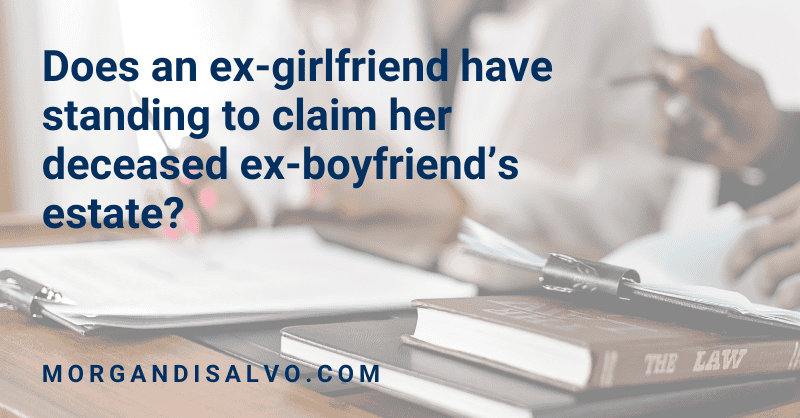Question: My family member died in accident. His ex-girlfriend is now claiming that they were engaged and that she has a Living Will written by him that leaves his estate to her. This purported Will looks suspicious, has no witnesses, and appears invalid under Georgia law.
She is adamant that she is entitled to his estate, but I feel she has no standing in court. Does an ex-girlfriend have the standing to claim her deceased ex-boyfriend’s estate?
Loraine’s Answer: Assuming that the facts you state are all true and that your family member had his principal residence in Georgia at the time of his death, the purported fiancée has no standing to make a claim against your family member’s probate estate, even if they were actually engaged.
The only people who automatically have any rights to a deceased person’s probate estate are that person’s heirs, as the heirs are defined by state law. In Georgia, the potential heirs only include a legally married spouse (not a fiancée or a former spouse) and then people who are related to the decedent through blood or legal adoption, such as parents, children and other descendants, grandparents, aunts, uncles, or cousins. Fiancées, stepchildren, and in-laws are not potential heirs.
Your family member’s ex-girlfriend/purported fiancée is effectively the same as a stranger with regard to your family member and his probate estate. She is not an heir since she was not his legally married spouse at the time of his death. This means that, unless he left a validly executed Will that makes her a beneficiary, she has no rights or interests with regard to the estate. (The only other possibility is that, if he owed her money and she has a legally enforceable claim, she could be a creditor of the estate. However, it does not sound like that is what she is claiming.)
Now, if the girlfriend is a properly designated beneficiary on an asset like a life insurance policy, an IRA, 401(k), or bank account, then she has the right to whatever she’s been designated as the beneficiary on. If she and your family member held any assets jointly with rights of survivorship (like a joint checking account), then she would have the right to the jointly owned asset or the assets in the joint account. However, neither of those rights would give her any rights to your family member’s probate estate, which contains any assets he owned that were not subject to any right of survivorship and that were not directed to a specific beneficiary under a beneficiary designations.
The purported fiancée will need to try to offer the purported Will for probate to claim any rights under it. Unless that happens, you can likely just ignore her. If she has already filed the Will for probate, then the appropriate heir or heirs will need to challenge the Will in the probate court. Get an attorney to help you with that. Estate litigation is not a good do-it-yourself project.
Key Estate Planning Takeaways: Nonfamily members, like current or former significant others, may lay claim to any asset on which they are a properly designated beneficiary or a joint owner with rights of survivorship. However, they do not automatically have rights to a decedent’s probate estate. In order to have rights with regard to a decedent’s probate estate, a party who is not an heir under state law must be either a beneficiary under a valid Will or a creditor with an enforceable claim against the deceased person or the estate.
This “Q&A with Loraine” blog series is inspired by answers from Morgan + DiSalvo Partner Loraine DiSalvo to actual user questions posted by individuals on www.avvo.com. This blog is a more in-depth response than can be given on their site under their character limits for answers. To view the original question and Loraine’s original response, click here.


